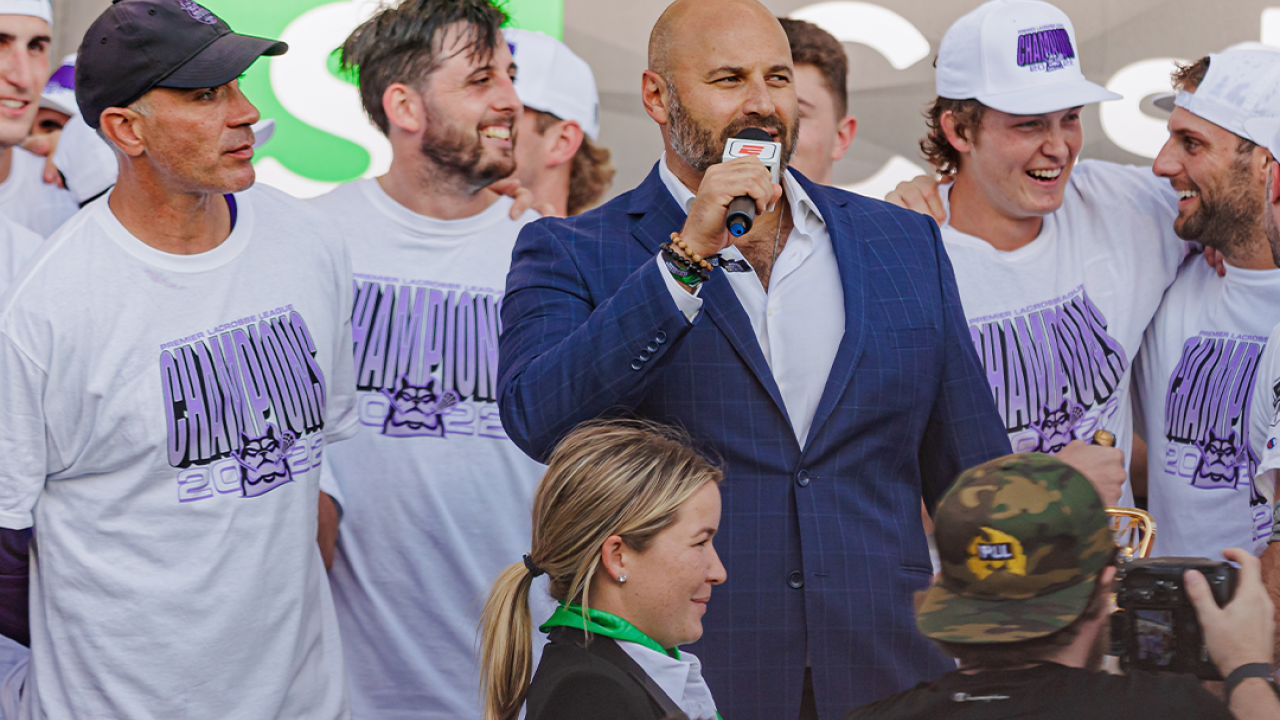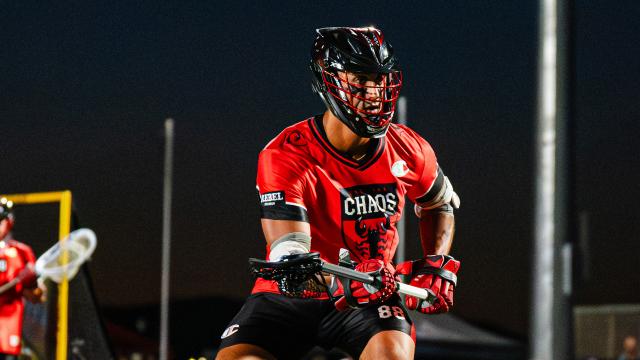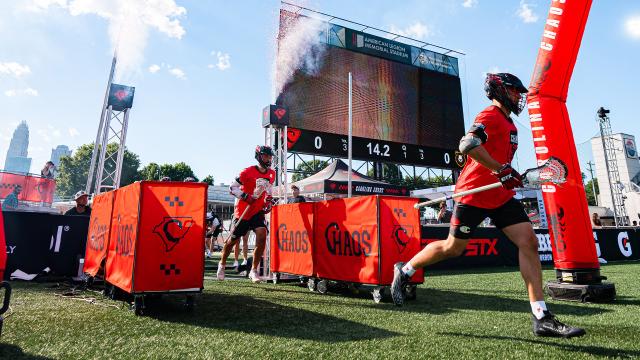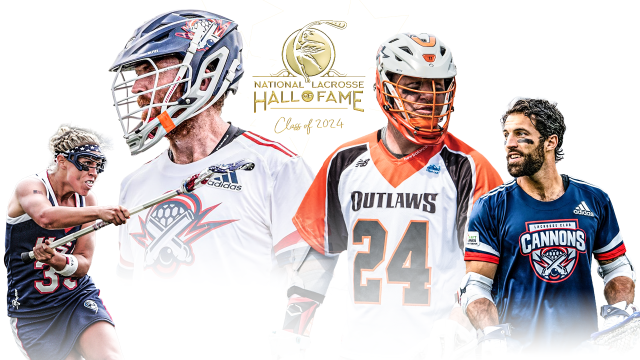
How Dartmouth Prepared Mike Rabil to Build the Premier Lacrosse League
After graduating from Dartmouth in 2006, Mike Rabil was a highly successful businessman — but he wanted more.
“I was able to take a step back and spend some time thinking about what I wanted to do, and how to really take a big swing at something,” Rabil said. “Having that moment when you can have the time and room to breathe was important.”
Rabil read the book “Pivot: The Only Move That Matters Is Your Next One” by Jenny Blake.
“Jenny was an early employee at Google, then she left during the great times to start her own thing,” Rabil said. “The mechanism of how she approaches thinking about what’s next in your career path was a big takeaway for me personally.”
When Rabil was thinking about what was next for him, a few values stood out as keys.
“The values are working with people I care about, creating financial prosperity and doing something that has an impact on people’s lives beyond just the core competencies of the company,” he said.
Rabil previously developed an entrepreneurial mindset, doing things such as building gyms in areas without great fitness facilities and small-business lending to people who couldn’t access capital. Then, the idea of the Premier Lacrosse League came to Mike and his brother Paul’s minds. It perfectly fit his values.
“I had an opportunity to work with my brother, who is heralded as one of the best lacrosse players of all time, and try to revitalize the oldest sport in North America,” Rabil said. “That was the swing we decided to take.”
The Rabils wanted to reinspire and reimagine the sport, especially at the professional level.
“Both men’s and women’s college lacrosse is played at an extremely high level with real viewership, real attendance and real attention,” Rabil said. “And it continues to grow but was previously struggling to match that trend on the professional level.”
Rabil used the word “anticlimactic” when describing the feeling after Memorial Day when the college lacrosse season ends. In his opinion, professional outdoor lacrosse didn’t capture the same enthusiasm.
“The sport is the Creator’s game,” he said. “It was originally created to pay homage to the Creator that gave resources to the native people … and it was played to honor the Creator.”
The Premier Lacrosse League is honoring the Creator in a significant way. Now in its fifth season, the league continues to grow, due in large part to the efforts of the Rabil brothers.
Rabil might not be where he is today, as the league’s co-founder and recent Sports Business Journal Forty under 40 honoree, if it wasn’t for his time at Dartmouth and with Dartmouth football.
“I got hand-me-down lacrosse equipment in seventh grade and Paul got it in fifth,” Rabil said. “In middle school, I played rec lacrosse in seventh and eighth grade then I continued with lacrosse and football in high school. I was a defensive tackle in football, which meant I competed in a heavier weight class.
“Since lacrosse is such an endurance sport, it made the fluctuation of weight from playing defensive tackle in football really difficult. My senior year, I dropped a bunch of weight, had a great senior year and was named an All-American by USA Lacrosse and got some other local accolades.”
At that time, Rabil was already committed to play football at Dartmouth. After extensively thinking about it, he decided to focus solely on football.
“In the end, I made my decision out of respect for the football program,” he said. “I committed there first and decided to concentrate solely on it, striving for excellence and revitalizing the football program. I wanted to try and be excellent at one sport.”
Rabil was excellent as a key contributor and eventual team captain. He learned life skills that have carried forward to today.
“Playing football at Dartmouth pushed me to dig deeper within myself than ever before to prove my commitment and resilience,” he said. “It was the hardest I’ve ever worked at something. When something gets really hard today, I think back to the two-a-days I had to do for two and a half weeks straight playing against guys who were bigger, faster, stronger than me and also managing the academic rigor of Dartmouth.”
Rabil also needed to be a student of the game.
“If I was playing against Yale, I’d have to study their playbook, studying who I’m going to play against all week long — mentally and physically preparing myself,” he said. “Having to prepare, not only as a student, but also going to battle on the field every single week, it was the hardest I’ve ever had to work.
“When I find myself in a hard situation now, I often think back to those difficult times that built a lot of character and determination.”
Rabil was friends with many from the lacrosse team, but that was the extent of his lacrosse involvement.
“My best friends, who are like brothers for me, are Dartmouth football guys,” he said. “Dartmouth football is deeply intertwined with my who I am, and I also hold a genuine connection to the lacrosse program. In fact, some of my closest friends from Dartmouth were part of the lacrosse team.”
For Rabil, lacrosse was on the backburner, and would continue to be over the first several years post-graduation.
Rabil’s first job was in commercial real estate doing sales.
“My experience in that role gave me a great foundation that could translate to so many other areas of my life,” he said. “At least in a corporate setting, almost everything requires some level of sales. Afterward, I transitioned to the consulting side for a couple years where we advised major Fortune 500 companies on real estate portfolios. This experience served as a valuable second training ground for developing corporate discipline in finance, accounting and presentation skills for third-party interactions.”
Rabil would then delve deeply into entrepreneurship.
“With my Dartmouth roommate, Alex Tonelli, we started a bunch of businesses together,” he said. “Working with him gave me the confidence to go out and try to start something on our own. We originally started by building fitness centers, so we built a portfolio, a holding company of a bunch of gyms.”
Rabil later spent four years at Funding Circle, which was a strong training ground for leadership.
“The first corporate job was more hygiene, and this was leadership, leading teams and accountability,” he said.
All of that led Rabil and his brother to the PLL. Speaking of leadership, the Rabil brothers’ leadership styles complement each other extremely well.
“I’ve been a company builder,” Rabil said. “I tend to think that I’m pretty decent at putting the right people in the right places, hopefully retaining our best people and putting a strategy together on an annual basis to execute against. I’m more on the commercial side of the business, focusing on leadership and our people. Paul really focuses on content, storytelling and the teams that go to him, whether it’s broadcast or content or social media — the product side of our lacrosse business.”
Paul Rabil is the face of Premier Lacrosse League, but it doesn’t mean Mike Rabil’s role isn’t as important.
“You grow up with your brother and you think you’re so alike because you’re friends, then you start working together and start to realize you’re way different than you think,” Mike Rabil said. “We complement each other well. What Paul does really well is he’s really creative. He has a creative mind; he’s almost a creative genius and understands content and storytelling.
“All of that sounds less quantifiable, but it’s a real, tangible skill set that you can’t replicate.”
As a former All-American midfielder at Johns Hopkins who also went on to a historic playing career professionally, Paul Rabil brings a lot of credibility within lacrosse.
“He grew up with social media and started in the early days of YouTube and Facebook,” Rabil said. “Before they even had their own player profiles, it was just his own personal page. He was an early adopter on Instagram. He’s this great media mind and amazing promoter of the league.
“If we need to go on TV, we’re putting Paul out there. And he’s great at it.”
Rabil is great at what he does as well, as evidenced by the Sports Business Journal recognition.
“SBJ is probably the best sports periodical in sports business,” he said. “To be recognized by that periodical is special. What they stand for in excellence and the fair, unbiased journalists that they have on staff, that journal is second-to-none.”
Rabil thinks about the SBJ recognition as a team award.
“I literally can’t do it without the people,” he said. “I have six internal meetings after this interview and all six of those people are the ones doing the real work. I’m just trying to find ways to keep them happy, hungry, inspired and also figure out if I can help them look around any corners they might not be seeing.
“The honor means a lot.”
Something else that means a lot to Rabil is Dartmouth and his time in Hanover, New Hampshire.
“Dartmouth created a better life for me,” he said. “I got to Dartmouth and saw a lot of different things that exposed me to worlds I didn’t even know existed. The diversity of people, their perspectives and exposure to new things was really eye-opening to me.”
Dartmouth also opened doors for Rabil, due to the tight-knit community that’s present well beyond graduation.
“When I hear that someone thinks about going to Dartmouth, I say you should try to do it,” he said. “If I ever meet someone who went to Dartmouth, they immediately look out for you. That’s not the same with every college. And there are people who went to Dartmouth — whether they’re friends of mine or alums who looked after me, have given me opportunity, have bended an ear or have taken me to coffee or lunch — who always have time for another Dartmouth alum.”
Dartmouth helped bring out the best in Rabil, as he learned how to work hard and always want more. Today, it’s paying dividends as the PLL’s co-founder.
“The time that you go to Dartmouth, particularly undergrad, is such a formative time of your life and it’s such a special place,” he said. “Football was a great framework for me to build incredible brotherhood relationships. Dartmouth does a good job of facilitating lifelong relationships better than any other institution I’ve been around.
“And ultimately, that’s what matters most.”
Justin Lafleur
Related Articles





